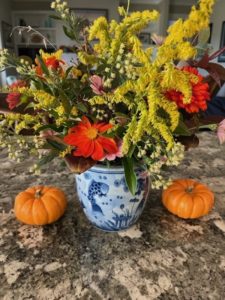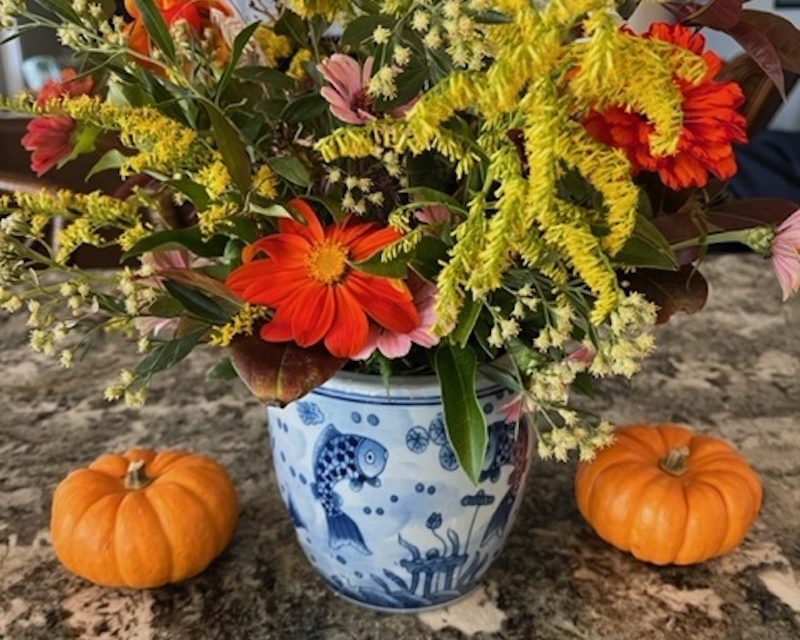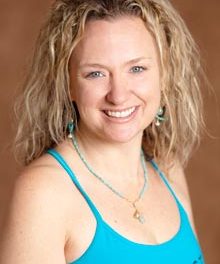 I love November – that crisp air, late fall flowers, slanting sunlight. It even gets dark early so cocktails come earlier. When I lived in Massachusetts we had 12 inches of snow on one Thanksgiving, and I still loved November. And I am not a fan of the color brown! I like fall foods – apples, anything with pumpkin spice (sorry), chili, and stews. I also love Thanksgiving. How can you not enjoy a holiday when all you have to do is eat and watch football? No gifts to wrap, no elaborate decorations, and no huge expectations on you to make this the best Christmas ever. Just eating yummy food.
I love November – that crisp air, late fall flowers, slanting sunlight. It even gets dark early so cocktails come earlier. When I lived in Massachusetts we had 12 inches of snow on one Thanksgiving, and I still loved November. And I am not a fan of the color brown! I like fall foods – apples, anything with pumpkin spice (sorry), chili, and stews. I also love Thanksgiving. How can you not enjoy a holiday when all you have to do is eat and watch football? No gifts to wrap, no elaborate decorations, and no huge expectations on you to make this the best Christmas ever. Just eating yummy food.
We are fortunate in this area to have some very interesting plants that come alive at this time of the year. Camellia sasanqua is one of my favorite shrubs. This Camellia blooms in the late fall and early winter. It has smaller flowers and leaves than its cousin Camellia japonica, but I love the early blooms. A variety named “Yuletide” seems to bloom quite early and although it might be done by Christmas, it brightens up the November landscape. The blossoms are bright red with yellow stamens in the center. It is worth noting that all Camellias are acid loving so you might wish to give them an occasional dose of a soil acidifier. Our Lowcountry soil tends to be on the acidic side, but Camellias tend to love more acid. The phosphorous in our soil can rob the soil of iron so if the leaves of your shrub start to look bleached out or yellow, add some iron. You have probably heard us say time and again that a soil test is a valuable tool to use. Our local Clemson Extension Office has soil test bags and you can drop your sample bags off there as well.
One of the most fun things to do this time of the year is to make a foraged arrangement. A foraged arrangement is made from things you find in your yard or in the woods. I find a suitable container and then either use a flower frog (those things with spikes in them that hold flower stems) or I use clear floral tape. I make a grid pattern across the top of the container that will hold the flower stems in place.
What to forage? Ornamental grasses have great seedpods this time of the year. Look for Muhly grass that is still pink or white. Northern Sea Oats also has interesting seed heads that look like little fish on wire. Although it is not a native, Pampas grass feathery heads can look attractive in an arrangement. You may find all sorts of interesting grasses growing in vacant lots or on the edges of your property.
Goldenrod may well be still in bloom. I read the other day that the native plant advocate and author of many books, Douglas Tallamy, states that the three most important things that you can plant for pollinators are Goldenrod, Asters, and Sunflowers. I have all three in my garden and I almost got fluttered to death the other day by butterflies flitting about. Goldenrod looks great in an arrangement along with Asters and Sunflowers.
Stems of berries are also wonderful for a pop of color in an arrangement. You may well have a holly bush in your yard that has red berries. I would recommend against using Yaupon Holly berries. Once inside the house, they tend to loosen from the stems and fall off making a mess.
The berries of Nandina (Sometimes called “Sacred Bamboo” or “Heavenly Bamboo”) are great for arrangements. I would not recommend planting the large variety of Nandina as it has been declared invasive in the southern states. If you do have some, remove the berries and use them in an arrangement. They can be toxic to birds so you are doing them a favor. The newer dwarf varieties of Nandina do not have toxic berries and are not invasive and they do have lovely color in the fall so their leaves can be used.
Many of you may have Loropetulum in your yard. It is sometimes referred to as “Chinese Fringe Flower” and it comes in many varieties from quite large to dwarf. They all have bright purple leaves all year long and look great for a pop of color in fall arrangements or any time of the year for that matter. That is one of my “go to” shrubs when I need fillers in a vase.
A great shrub that florists depend upon is St. John’s Wort (Hypericum spp.) This shrub has bright yellow buttercup like flowers. The best part is the berries that can range from orange with yellow highlights to red. They last a long time after having been cut and you will see them in floral arrangements in your supermarket as well as expensive florists. St. John’s Wort grows well down here in full or partial sun. Although it is used as a folk medicine and can even be found in over the counter drugs, never ingest anything in your yard without knowing what it is and any side effects. Leave medications to your doctor and pharmacist!
One last thing that is fun to do for arrangements at different times of the year is to collect interesting sticks and spray paint them. I have red and orange sticks for fall and white sticks and branches for winter interest. I also save Allium seed heads and spray paint those and use them in arrangements. They look a little like something from outer space, but what a great effect!
Enjoy November and foraging for an inexpensive way to decorate your house for Thanksgiving.







